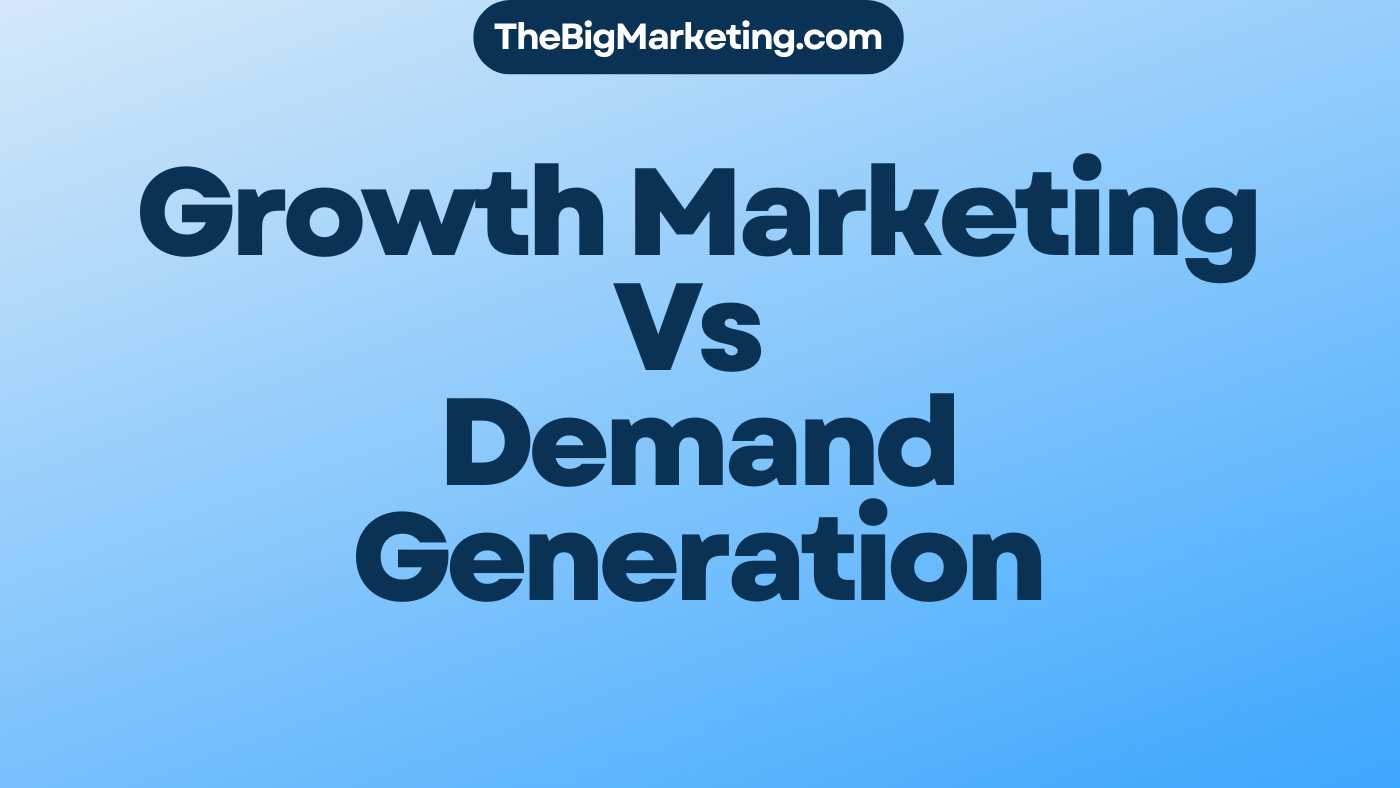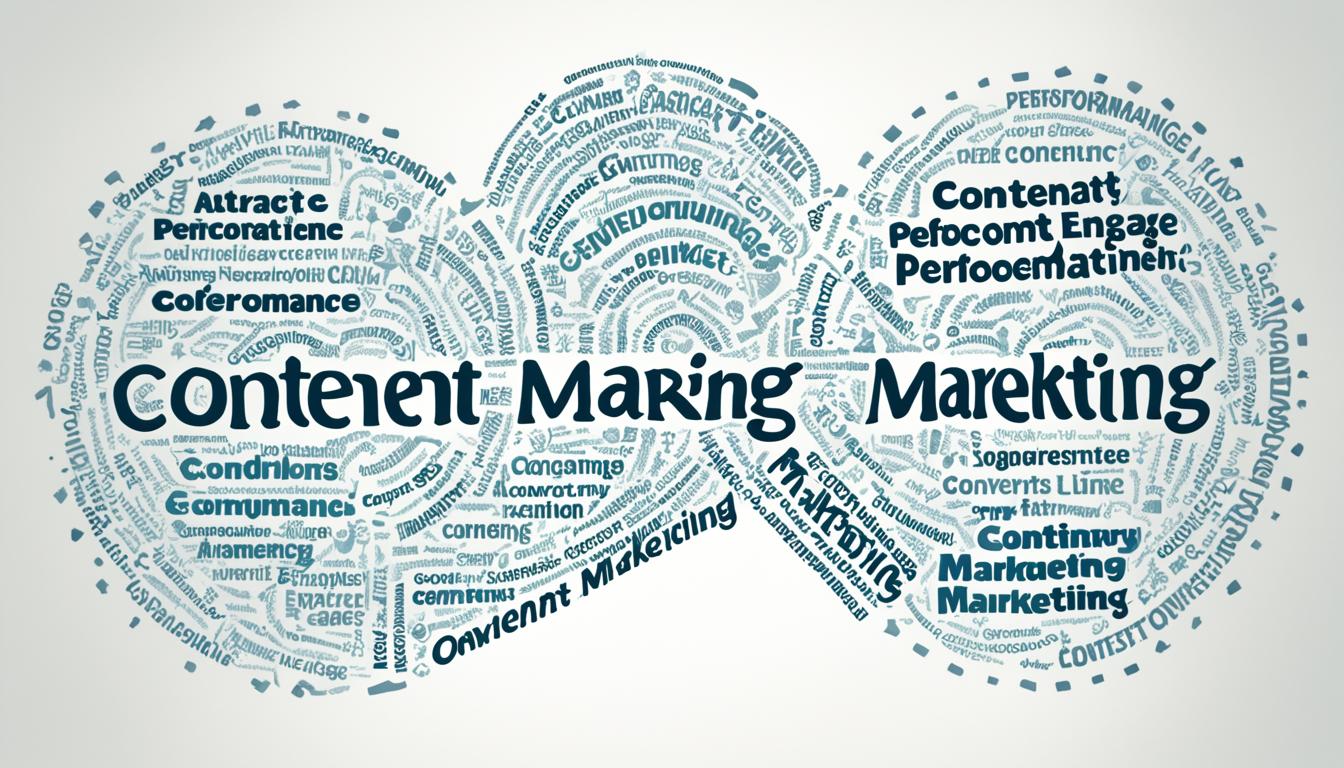The Content Marketing Institute (CMI) is an expert source for grasping how content marketing shapes current marketing plans. CMI sees content marketing as a focused way to make and share valuable, fitting, and steady content. This attracts and keeps a well-defined group of people.
Content marketing isn’t about pushing a product directly. Instead, it’s about giving helpful articles, guides, and newsletters. This way, companies grow their relationship with their audience and become seen as reliable leaders.
Now, let’s dive into some instances where content marketing truly shines in different sectors.
Key Takeaways:
- Content marketing is a strategic approach focused on creating and distributing valuable, relevant, and consistent content.
- It aims to attract and retain a clearly defined audience, emphasizing education and entertainment over direct selling.
- Examples of content marketing include articles, guides, newsletters, and other helpful resources.
- Content marketing builds connections with the audience and establishes the brand as a trusted resource.
- CMI serves as an authoritative resource for understanding content marketing and its impact.
Examples of Everyday Content Marketing
Content marketing is used in many industries, showing its ability to engage people and grow businesses. We will look at some great examples of content marketing:
HomeX Plumbing and Rooter
HomeX Plumbing and Rooter is well-known for plumbing services. They provide helpful content like fixing common plumbing problems, including water leaks. This makes HomeX seen as plumbing experts and gains trust from their customers.
By offering DIY solutions, HomeX proves their expertise while promoting their services. This is a smart move.
Fidelity’s Financial Newsletter
Fidelity, a famous brokerage firm, focuses on teaching their audience. Their newsletter discusses many financial topics, including retirement planning. They give useful information on retirement products, making themselves a go-to resource.
This strategy keeps current customers interested and draws in new ones needing financial advice. It’s effective.
Game Informer’s Gaming Content
Game Informer is a well-liked video game magazine and website. They offer deep news, reviews, and content that gamers love. By always having great content, Game Informer keeps their community engaged and loyal.
This approach shows they know their stuff, bringing more visitors and interaction to their site.
Charles Schwab’s WashingtonWise Podcast
Charles Schwab, a respected financial institution, sees the importance of audio content. They have the WashingtonWise podcast, talking about investor-related news and policies. Podcasts let Charles Schwab reach their audience easily and share their knowledge.
Ocean Spray’s Seasonal Newsletter
Ocean Spray, a top cranberry producer, gets creative with content marketing. They send out a seasonal newsletter with tasty cranberry recipes. This reaches a wide audience, even beyond their usual buyers.
With this engaging content, Ocean Spray boosts their brand’s image and creates positive vibes around their products.
These cases show how content marketing can be customized for various audiences and fields. Be it through educational articles, engaging newsletters, websites focused on community, podcasts, or creative seasonal content, content marketing is key to effective marketing plans.
The Importance of Content Marketing in Marketing Strategies
Content marketing is vital in today’s marketing strategies. It gives businesses chances to connect with their audience and achieve success. By using best practices and tools from CMI, companies can boost their marketing efforts and reach their goals.
Email Marketing
Content marketing is key to successful email marketing. It delivers content that educates and engages readers. With CMI knowledge, firms can craft content that makes readers look forward to their emails. This leads to better open rates, more clicks, and higher conversions.
Social Media Marketing
For social media success, content strategy comes first. Using CMI’s guidance, firms can craft content that strikes a chord with their audience on social platforms. This type of content increases brand awareness, loyalty, and social media growth.
Search Engine Optimization (SEO)
High-quality content is vital for better SEO. By sticking to CMI’s best practices, companies can enhance their online materials. This improvement in content helps a business’s website and posts climb higher in search results. Good SEO practices drive organic traffic and make a business more visible to potential customers.
Public Relations (PR)
Content marketing and PR strategies go hand in hand. They both aim to captivate and provide value to readers. With CMI advice, businesses can produce content that educates and entertains, building trust. By distributing content wisely and using CMI tools, companies can boost their reputation, media relations, and establish authority.
Pay-Per-Click (PPC) Advertising
Great content boosts PPC campaign effectiveness. By adopting CMI’s best practices, firms create compelling content for their PPC ads. This leads to a better user experience, more clicks, and higher conversion rates. It all adds up to a stronger return on investment for their PPC efforts.
Inbound Marketing
Inbound marketing depends on strong content to attract and nurture leads. Following CMI best practices helps businesses pull in traffic and generate solid leads. Good content draws potential customers in, guiding them through the buying process and boosting conversion chances.
Digital Marketing Strategies
Content marketing is crucial for digital campaigns. It sets the groundwork for success. By using CMI’s resources, businesses can craft strategies that integrate seamlessly with their overall marketing goals. This approach amplifies the effectiveness of various digital marketing channels, leading to better outcomes.
Content Strategy
Content strategy involves managing a company’s content. Applying CMI’s best practices ensures strategies meet business objectives and audience needs. A clear content strategy guarantees consistency, quality, and relevance in all marketing content, enhancing its overall impact.
Content marketing is central to effective marketing strategies. Using CMI’s certification, insights, and tools enhances marketing efforts. It helps companies connect with their audience and drive significant results.
Benefits of Content Marketing
Content marketing boosts a business in many ways. It increases sales by teaching and caring for potential customers until they buy. This approach also cuts costs when compared to traditional marketing methods. By sharing valuable content regularly, a business can gain its audience’s trust and make its brand well-known. This often brings in customers who are more loyal. When content is used right, it can even start making money for the business. Businesses that use content marketing often get six times more customers than those that don’t. This shows that content marketing is both effective and affordable, making it a great choice for businesses.
Benefits of Content Marketing:
- Educates and nurtures leads, leading to conversions
- Saves costs compared to outbound marketing tactics
- Builds credibility, trust, and brand awareness
- Attracts better customers with increased loyalty
- Generates content-driven revenue
- Converts six times more leads compared to non-content marketing organizations
Content marketing stands out as a powerful strategy for businesses of all types. By offering valuable, relevant content, companies can connect with their audience. They can teach them, build trust, and inspire them to act in profitable ways. For businesses aiming for success, the effectiveness and affordability of content marketing can’t be beaten.
| Benefits | Description |
|---|---|
| Educates and nurtures leads, leading to conversions | Valuable content helps businesses teach their leads and guide them to make purchases, increasing conversions. |
| Saves costs compared to outbound marketing tactics | Content marketing is cheaper than classic advertising methods. It helps businesses stay within their marketing budgets. |
| Builds credibility, trust, and brand awareness | Sharing great content regularly makes a business a trusted industry leader. This builds credibility and makes more people know about the brand. |
| Attracts better customers with increased loyalty | Through valuable content, businesses draw in customers who are likely to stay loyal and feel a stronger brand connection. |
| Generates content-driven revenue | Content marketing can create income through things like sponsored content, partnerships, or more sales chances. |
| Converts six times more leads compared to non-content marketing organizations | Companies using content marketing strategies convert six times more leads. This means more sales and growth for the business. |
The Role of Content Marketing in Building Brand Awareness and Credibility
Content marketing is key in boosting brand awareness and trust. Through regular sharing of useful content, companies become industry leaders. This gains the audience’s trust.
Content marketing lets businesses teach their audience. They talk about their offers and what makes them special. This way, they connect with their audience.
Studies say content marketing makes brands more visible and known. When companies share interesting and helpful content often, they stand out from the competition.
Content marketing also helps with building trust. By sharing expert advice and solutions, companies show they know their stuff. This makes the audience trust and stay loyal to the brand.
It’s also a way to teach the audience about new trends and technologies. Being a trustworthy info source, businesses can lead the conversation. This earns their audience’s trust.
Putting it simply, content marketing is great for making brands known and trusted. By always sharing great content, companies make a strong name for themselves.
Example:
Consider XYZ Digital Solutions, a top software development firm. They often post blogs, whitepapers, and studies that give insights into the latest digital trends and tech.
By giving out their knowledge, XYZ Digital Solutions has become a go-to place for those in the industry and future clients. This has boosted their market status, leading to more brand visibility and growth.
With a good content marketing plan, businesses can really improve their brand’s image. They gain credibility and build strong ties with their audience.
The Long-Term Approach of Content Marketing
Content marketing is a strategy that looks ahead. It doesn’t just focus on quick sales. Instead, it aims to build a lasting relationship with customers. It does this by first creating awareness and educating them. Then it showcases the benefits of products as customers move closer to buying. Even after a purchase, content marketing works to keep customers coming back.
What sets content marketing apart is its focus on lasting relationships. It creates many touchpoints during the customer journey. This helps businesses build trust, credibility, and loyalty. By offering valuable content regularly, businesses stay connected with their audience. They provide support and keep educating their customers, building a strong, loyal base.
Advantages of the Long-Term Approach
The long-term approach of content marketing has several benefits:
- Relationship Building: Content marketing nurtures leads and keeps up engagement, building strong, lasting relationships.
- Brand Recognition: Consistent content helps increase brand awareness and recognition.
- Credibility and Trust: Offering valuable content makes businesses credible and trustworthy in their industry.
- Customer Loyalty: Regularly providing value ensures customer loyalty and encourages them to return.
- Repeat Engagements: This strategy keeps customers engaged beyond the first purchase, leading to more sales and referrals.
| Advantage | Description |
|---|---|
| Relationship Building | Nurturing leads and engaging with customers to establish strong relationships. |
| Brand Recognition | Increasing brand awareness and recognition through consistent content delivery. |
| Credibility and Trust | Positioning businesses as credible and trusted resources in their industry through valuable content. |
| Customer Loyalty | Fostering loyalty and encouraging repeat business by providing ongoing value to customers. |
| Repeat Engagements | Maintaining customer engagement even after the initial purchase, leading to upsells, cross-sells, and referrals. |
The Impact of Content Marketing on Lead Generation and Sales
Content marketing is key in getting leads and sales up for companies. It involves creating and sharing content that matters to people. This helps pull in potential buyers and lead them through the buying process.
It’s been shown that good content marketing strategies create more leads. They also have better conversion rates than old-school marketing. The Content Marketing Institute (CMI) found that businesses focusing on content marketing see a 50% boost in sales. Plus, they spend less money.
Content marketing connects with customers by meeting their needs. It offers answers through helpful and educational content. This shows off what the products or services can do. It also shows the company knows its stuff, earning the audience’s trust.
By always giving out valuable content, companies can make more people aware of their brand. They can pull in the right leads and keep customers coming back. Content marketing places businesses as go-to experts in their fields.
In short, content marketing is a strong way to get leads and sales. It creates real connections and gets customers to take action. Using CMI’s tips and tricks can really help a business grow and do well.
The Impact of Content Marketing on Lead Generation and Sales
| Benefits | Statistics |
|---|---|
| Increase in leads | Content marketing generates more leads compared to traditional marketing methods. |
| Higher conversion rates | Effective content marketing strategies increase conversion rates. |
| Cost-effectiveness | Content marketing nurtures leads at a lower cost compared to traditional marketing tactics. |
| Established connection | Content marketing establishes a connection with customers, addressing their needs and demonstrating value. |
| Increased sales and loyalty | Content marketing leads to increased sales and fosters customer loyalty. |
Choosing the Right Content Platforms and Formats
Selecting the right platforms and formats is vital for good content marketing. It’s important to know what your audience likes. Social media, websites, blogs, podcasts, and videos provide ways to connect with them.
Think about what your audience enjoys and your goals. Knowing your audience’s details helps choose the best ways to share content.
If your audience is young professionals on social media, focus on catchy posts and videos. But, if they like detailed articles, consider writing blog posts and whitepapers.
Using the channels your audience likes will make your content marketing more effective. This improves engagement and helps turn your audience into customers.
Consider the following factors when choosing content platforms and formats:
- Demographics: Knowing age, gender, and location helps decide where your audience is.
- Interests: Find out what topics your audience likes to shape your content.
- Lifestyles: See how your audience uses content to pick the best platforms and formats. For instance, if they listen to podcasts while commuting, create audio content.
Considering these factors and matching them with your goals helps pick the right platforms and formats. This way, you can reach and engage your audience well.
Choosing suitable platforms and formats is key for successful content marketing.
Sustaining Customer Relationships through Content Marketing
Content marketing does more than just get new leads. It helps keep existing customers connected to the brand. By sharing useful content regularly, businesses remind their customers why they chose them. Using email, social media, and even direct mail keeps this connection strong.
It’s smart to keep talking to customers and offer them special deals or content. Doing this makes them feel valued and more likely to stick around. Businesses can create loyal fans by continuing to engage with customers after they’ve made a purchase.
Becoming a brand that customers feel exclusive to can be powerful. Providing ongoing, useful content helps maintain this bond. This approach shows that a business cares about more than just sales. It values lasting customer happiness.
Taking a Strategic Approach to Content Marketing
To succeed in content marketing, businesses must plan carefully. They need to develop a clear content marketing strategy. This strategy should match business goals with what the audience needs.
The strategy points out which content to make and where to share it. It talks about how to measure and improve results over time. Building this strategy involves knowing the audience well, studying the market, and checking out the competition.
With a smart strategy, businesses can use content marketing to reach their goals effectively.
Conclusion
Content marketing is key today. It helps businesses attract and connect with their audience by sharing valuable content. This boosts brand trust, generates leads, and increases sales. A smart plan that matches content with business goals and audience needs makes marketing more effective.
Companies become trusted by sharing helpful info, leading to strong customer relationships. High-quality content makes them stand out as industry leaders. Picking the right channels ensures the message reaches the right people. Also, a clear strategy allows for tracking progress and making necessary adjustments.
Content marketing does more than just sell; it informs, educates, and entertains. Resources from the Content Marketing Institute, like CMI Best Practices, help businesses stay ahead. Getting CMI Certification enhances a marketer’s skills, making them more effective in their role.



